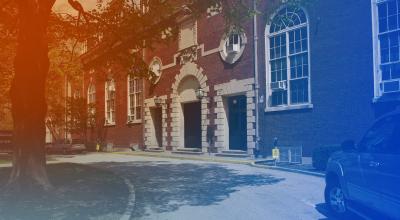
Helping Our Educational Mission
AHS E-News September 2021

When we think of supporting an institution or program we love, we often focus on donating money. Support can also come in the form of donations of time and expertise, however, and these donations can have an important and lasting impact on the educational experience of current students.
Every department in the College of Applied Health Sciences encourages—and, in many cases, requires—students to gain professional experience through internships and external placements, either at the undergraduate or graduate level. It is in providing those opportunities and venues for professional growth that alumni and other supporters of AHS programs can make a difference.
Through internships and external placements, students get a sense of what their chosen professions are like in the real world and are exposed to a variety of career options. Dr. Noa Hannah, clinical assistant professor in the Department of Speech and Hearing Science and director of the Audiology and Speech-Language Pathology Clinic, stated that a variety of barriers and the nature of the client population can limit the new skills students can learn in the Clinic. External placements for graduate students provide opportunities to experience other clinical environments, such as hospitals, schools, and private practices.
“This not only has a direct impact on our students’ learning clinical skills, but also helps them learn about the environments, people, and cultures of different placements,” she said. “Many students start their graduate work thinking that they want to work with a specific population, for example pediatrics. After completing their external rotations, their newfound passion for adults in a rehabilitation facility. It is amazing to watch them grow.”
It’s also about growing as professionals, added Dr. Sadie Braun, visiting clinical assistant professor who oversees the clinical education of audiology students.
“When they’re out in the real world, they get a sense not only of what a very busy clinical experience is like, but also work on the professionalism component, and putting it together,” she said. “I think that’s when a lot starts to jell between what they’re learning in their academic classes and what they’re doing in clinic.”
In the Department of Recreation, Sport and Tourism, undergraduate students must complete a 400-hour internship as part of their graduation requirements. The department offers two internship classes: a one-credit, 200-level class that enables students to try out positions in which they have interest—they can take the class up to three times; and a 12-credit, 400-level pre-practicum class that leads up to the final internship. Many of the sites sponsoring internships are involved because employees who are RST alumni want to give current students the kind of support they received as undergraduates. The internship program provides other opportunities for involvement as well, such as giving presentations in the internship classes.
“Alumni can’t wait to share their experience and how they got started, and the students are eager to hear it,” said Terri Daniels, RST internship and engagement coordinator. “What was their path? What is their advice? It’s so valuable to hear it from somebody who’s out there working in the field.”
Students gain valuable experience and knowledge from professional experiences, but internships and external placements benefit the sponsoring sites as well. Organizations have an opportunity to contribute toward shaping the future of their fields, and to address problems that they may not have had time or staffing to address previously.
“I think it’s a great opportunity for them to have a fresh perspective on tackling a project, and access to cutting-edge knowledge and University resources,” said Dr. Laura Rice, interim director of the Master of Public Health and Master of Science in Health Administration degree programs in the Department of Kinesiology and Community Health. Both programs require students to complete professional internship and capstone experiences. “They also are a great recruiting tool for new employees,” she added.
The Master of Science in Health Technology in KCH also requires students to have a capstone professional experience. This unique degree program draws on human factors and engineering concepts to develop human factors specialists with an emphasis on health technology. The first cohort graduated in August after completing capstone experiences with such organizations as AARP, State Farm Sundial Labs, and University of Chicago Medicine. Dr. Nicole Holtzclaw-Stone, MS-HT assistant director and academic advisor, says people are interested in becoming capstone sponsors because they know the students will be highly qualified and they are interested in helping students succeed.
“I think the capstone is a great opportunity for someone who is out in the working world to re-engage with the students at Illinois,” she said. “You can give your time and your expertise, which is very valuable. It’s a new way and a great way to be involved.”
If you are interested in offering an external placement experience to AHS students, contact:
MPH: MPH Admissions
MSHA: MSHA Admissions
MS-HT: Nicole Holtzclaw-Stone
RST: Terri Daniels
SHS: Noa Hannah
